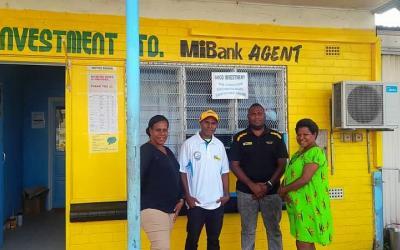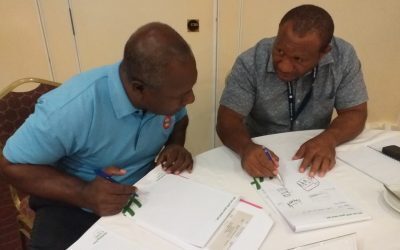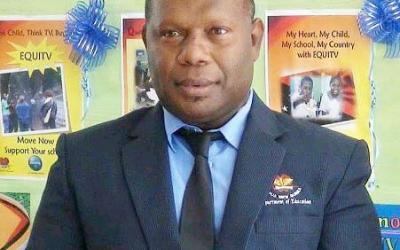
About Short Course Awards
Applications for 2024 Short Course Awards are now closed.
Australia Awards Short Courses are targeted programs of intensive training for selected cohorts to address specific technical or soft skills gaps in PNG, delivered by reputable Australia education providers.
In 2024, four Short Course Awards were offered:
- Graduate Certificate in STEM Education
- Graduate Certificate in Inclusive Education
- Graduate Certificate in Mental Health
- Graduate Certificate in Nutrition
Previous Short Course Awards are listed here.

Benefits of Short Course Awards
- Specialised course delivered by reputable Australian education providers
- Flexibility for senior staff who may have already received post-graduate qualifications or are unable to be released for longer-term study
- Support for pre-course and post-course workshops
- Opportunities for professional networking through meetings, events and site visits in Papua New Guinea and Australia
- Support for personal or group Short Course Award workplace projects for participants
- Opportunities for networking with more than 5,000 alumni in PNG, most of whom have an excellent record of rising to positions of leadership across a wide range of fields
Short Course Award Features
Short Course Awards are delivered as a pre-course and post-course workshops in Papua New Guinea (1 week each) and up to 3 months study in Australia and/or Papua New Guinea. On completion of the formal study components, participants are also required to complete a Workplace Project, to apply their learning in their workplace. More information on Workplace Projects is below.
Participants receive:
- Return airfares to participate in study (domestic and international)
- Accommodation at course locations
- Per diems when living away from home
- Tuition fees
- Australian visa
- Health cover for the duration of Short Course Award in Australia.
All prospective applicants must adhere to Australia Awards general minimum selection requirements:
- be a minimum of 18 years of age at the time of commencing the Short Course Award.
- have a minimum academic English proficiency of IELTS 6.5.
- be a citizen of PNG and be residing in and applying for the Short Course Award from PNG.
- not be a citizen of Australia, hold permanent residency in Australia or be applying for a visa to live in Australia permanently.
- not be married, engaged or a de facto partner of a person who holds, or is eligible to hold, Australian or New Zealand citizenship or permanent residency, at any time during the application, selection or mobilization phases of the Short Course Award.
- be able to satisfy admission requirements of the institution at which the award is to be undertaken.
- be able to satisfy all requirements of the Australian Department of Home Affairs to hold a suitable Australian visa.
- not have been convicted of a criminal offence.
In addition to the above, each Short Course Award will have specific eligibility criteria tied to the course focus (refer to the Apply Now page for the Short Course Award Factsheets and specific course eligibility). Some examples may include:
- be currently employed in the relevant role and organisation the course is targeting
- have sufficient experience according to the requirements of the specific course (e.g. minimum number of years work history)
- have minimum qualifications required, usually a Bachelor’s degree
- have satisfied any specific criteria established by the specific Short Course Award you apply for
- successfully complete an IELTS test (if required, AAPNG will make arrangements)
Public sector applicants may be required to complete a training bid form and supply necessary supporting documents to the Department of Personnel Management (DPM). Refer to DPM General Orders for further information and/or your HR representative.
You will be required to submit a range of supporting documents when applying for a Short Course Award. Some of these documents will need to be certified (i.e. certified by a commissioner of oaths).
We encourage those looking to apply for a Short Course Award to begin work on preparing all required documentation for certification and upload. These include:
- National Birth Certificate – certified copy
- National Identification Card – certified copy
- PNG Drivers’ License – certified copy
- Passport (most recent valid or expired) – certified copy
- Valid Australian visa (if you already have one)
- Curriculum Vitae (CV) Form [template here]
- Certificate of highest education qualification – certified copy
- Academic transcript – certified copy
- Certification of most recent English language test (if you have sat one) – certified copy
- Workplace Project Design [template here]
- Current Employer’s Support Statement [template here] – completed and signed by employer
- Applicant’s Declaration and Signature [template here] – completed and signed by you
To ensure that participants apply learnings within their organisations and wider community, participation in Short Course Awards is underpinned by a workplace project. All participants are required to develop and implement a small workplace project which is related to the course topic and learning objectives that utilises the knowledge and skills gained from the course.
The proposed workplace project should contribute to your organisation and its priorities and look to:
- Pass on new skills and knowledge to others.
- Apply new skills in daily work.
- Contribute to the development or implementation of policies, guidelines, practices or standards, or to strategic management.
Workplace projects must be achievable in an eight to 12-month period and be supported by your employer/organisation. Australia Awards will not provide additional funding for workplace projects.
Focus areas of workplace projects are determined in consultation with the participant and their employer, taking into consideration organisational needs and desired outputs and outcomes. It is important that workplace projects are endorsed by the organisation before participants commence.
A copy of the workplace template to be completed as part of any Short Course Award application can be found here.
- Questions to consider when planning your workplace project
- Is the workplace project in line with my job? (Must be in line with your job, organisational priorities and align to the specific short course objectives)
- What organisational need, issue or opportunity will the workplace project respond to? (Consider research documents and reports)
- What broader organisational objective will the workplace project align with? (Refer to corporate and strategic plans)
- What PNG development priority does the workplace project align with? (See Vision 2050 or other policy documents)
Examples of workplace projects by previous Short Course Award participants
Training manual for guidance officers and teachers by Philip So’On
Systematic literature review by Hannelly Kiromat-Geno, Senior Project Manager at Marie Stopes PNG
Short Course Award Stories
More than just a small business
27 June 2022 - Micro, Small and Medium Enterprises Day recognizes the role Micro, Small and Medium Enterprises (MSMEs) play in the preservation of economies and advancement of people and planet. A struggling small business owner, Glenda Supring revived her failed...
Driving an innovative future through STEM Education
Inapero Huhuva has been teaching for 14 years and is currently the Senior Subject Master of the Science Department at the Port Moresby National School of Excellence. He is about to complete a Graduate Certificate in Science, Technology, Engineering and Mathematics...
Creativity and innovation, the way forward
When Malachai Nathaniel began his Australia Awards Graduate Certificate in STEM Education short course in February 2020, he had big plans to incorporate science, technology, engineering, and mathematics (STEM), into Papua New Guinea’s education curriculum. “Our...


